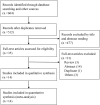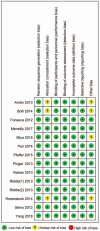PRISMA-efficacy and safety of lixisenatide for type 2 diabetes mellitus: A meta-analysis of randomized controlled trials
- PMID: 30572502
- PMCID: PMC6320179
- DOI: 10.1097/MD.0000000000013710
PRISMA-efficacy and safety of lixisenatide for type 2 diabetes mellitus: A meta-analysis of randomized controlled trials
Abstract
Objective: We aimed to systematically evaluate the efficacy and safety of lixisenatide in patients with type 2 diabetes mellitus.
Methods: PubMed, EMBASE, Cochrane Library, ClinicalTrials.gov, Google, Web of Science and the Chinese Science Citation Database were searched up to March 2018. Randomized controlled trials determining the efficacy and safety of lixisenatide in patients with type 2 diabetes mellitus were eligible for inclusion. Two authors independently extracted the data in a prespecified Microsoft Excel spreadsheet. A meta-analysis was performed using Review Manager 5.3 software. Weighted mean difference (WMD) and relative risk (RR) together with their corresponding 95% confidence intervals (CIs) were estimated, and only the random effects model was used in order to achieve a more conservative estimate of the efficacy and safety.
Results: Fourteen multicenter randomized controlled trials involving 11,947 patients were eligible for inclusion. Compared to placebo, lixisenatide could more significantly reduce the level of HbA1c (WMD=-0.44; 95% confidence interval [CI] [-0.55,-0.33]), and a higher proportion of lixisenatide-treated patients achieved the HbA1c level of < 7.0% (RR = 1.89, 95% CI [1.75-2.03]) and < 6.5% (RR = 3.03, 95% CI [2.54-3.63]) than the placebo-treated patients. Lixisenatide was also associated with a significant reduction in fasting plasma glucose and 2-hour postprandial plasma glucose levels. The risks for any adverse events, gastrointestinal adverse events, and symptomatic hypoglycemia significantly increased in the lixisenatide-treatedment group compared to those in the placebo group. However, lixisenatideit did not increase the risks of serious adverse events, death, or severe hypoglycemia.
Conclusions: Lixisenatide was more effective than placebo in patients with type 2 diabetes mellitus, and the mild-to-moderate adverse events were found to be tolerated during the follow-up.
Conflict of interest statement
Conflicts of Interest and Source of Funding: The work was supported by Gansu province Science and Technology Support Program (1204FKCA138). No potential conflict of interest relevant to this article was reported.
Figures





References
-
- International Diabetes Federation (IDF) [homepage on the Internet]. IDF diabetes atlas. 8th edition. [updated 2017]. Available from: http://www.idf.org/diabetesatlas.
-
- Bolli GB, Owens DR. Lixisenatide, a novel GLP-1 receptor agonist: efficacy, safety and clinical implications for type 2 diabetes mellitus. Diabetes Obes Metab 2014;16:588–601. - PubMed
Publication types
MeSH terms
Substances
LinkOut - more resources
Full Text Sources
Medical

